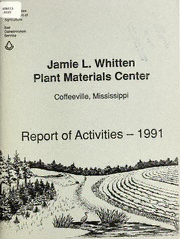
Report of activities PDF
Preview Report of activities
Historic, Archive Document Do not assume content reflects current scientific knowledge, policies, or practices. aSB123 ites . A1U5 nt of Agriculture Soil Conservation Service Jamie L. Whitten Plant Materials Center Coffeeville, Mississippi Report of Activities - 1991 Jarnie L. Whitten Plant Materials Center Coffeeville, Mississippi Report of Activities - 1991 Including Field Activities in Arkansas, Louisiana and Mississippi STAFF Manager David M. Lane Assistant Manager Joseph A. Snider Leader, Special Projects B. B. Billingsley, Jr. Conservation Agronomist Luther H. Bloodworth, Jr. Biologist Janet M. Grabowski Biological Technician William D. Benoist Secretary Laura T. Mason Tractor Driver Jimmie Miller Plant Materials Specialist W. Curtis Sharp, NHQ, Washington, DC H. Wayne Everett, SNTC, Ft. Worth, TX James A. Wolfe, AR-MS, Coffeeville, MS State Conservationists' Advisory Committee L. Pete Heard, MS, Chairman Ronnie D. Murphy, AR Horace J. Austin, LA Jerry S. Lee, TN Artwork by Dean Foster, SCS, Civil Engineering Technician, Jackson, MS All USDA programs and services are available without regard to race, color, national origin, religion, sex, age marital status, or handicap. REPORT OF ACTIVITIES - 1991 JAMIE L. WHITTEN PLANT MATERIALS CENTER Coffeeville, Mississippi TABLE OF CONTENTS INTRODUCTION Facilities Weather Service Area Long Range Program MAJOR PROJECTS IN 1991 Projects for Release of Improved Cultivars Step 1: Assembly Step 2: Initial Evaluation Step 3: Initial or Small Scale Increase Step 4: Advanced Testing Step 5: Field or Large Scale Increase Step 6: Field Plantings Step 7: Cultivar Release and Use Projects to Develop Improved Methods Cover Crop Trials for No-Till Cotton Concluded Herbicide Trials for Selected Plants Biotechnical Applications using Vetiver Grass FIELD ACTIVITIES IN ARKANSAS, LOUISIANA, AND MISSISSIPPI Vegetation for Surface Mine Reclamation t , Completed Evaluations in Mississippi and Louisiana Evaluations in Progress in Arkansas Native Vegetation for Natchez Trace Parkway Wetland Plants for Waterways Experiment Station Field Plantings Release Candidates from Coffeeville PMC Cultivars or Release Candidates from Other PMCs MATERIALS AVAILABLE FOR COMMERCIAL INCREASE TECHNICAL PAPERS WRITTEN IN 1991 REPORT OF ACTIVITIES - 1991 JAMIE L. WHITTEN PLANT MATERIALS CENTER COFFEEVILLE, MISSISSIPPI INTRODUCTION The Jamie L. Whitten Plant Materials Center (PMC) is operated by the United States Department of Agriculture, Soil Conservation Service (SCS). Formerly called the Coffeeville PMC, the center was renamed the Jamie L. Whitten PMC on May 24, 1991, in honor of Congressman Whitten from nearby Tallahatchie County, Mississippi, for his leadership and support for conservation. The PMC is part of a network of 2 6 centers operated by the SCS. The National Plant Materials Program began soon after the SCS was founded because it was recognized that better plants were needed. The purpose of the Plant Materials Program is to select improved plant cultivars and develop better methods for the prevention of soil erosion using plants. When cultivars are shown to be superior, they are released to the public for commercial production. Since the program was started, about 300 varieties of superior plants have been released. Many of these are well adapted to the South. The most outstanding of these is probably 'Pensacola' bahiagrass (Paspalum notatum). The Coffeeville PMC began as part of the much larger Flood Prevention Seed Unit on August 8, 1960. In 1982, the Seed Unit was discontinued and plant materials activities were reorganized and expanded. Throughout its history, the PMC has evaluated over 6,800 plants. A number of these were determined to be superior conservation plants and were later released, not only by Coffeeville but by other PMCs and experiment stations. Facilities The Jamie L. Whitten PMC is located within the Holly Springs National Forest on state Hwy. 330 between Coffeeville and Tillatoba. About 5 miles east of Interstate 55 is the headquarters area consisting of an office, greenhouse, seed cleaning and warehouse building, and equipment sheds. In 1990, a program was initiated to upgrade facilities to accommodate recent and rapid advances in biotechnology. The 1200 sq. ft. office building was expanded to 2800 sq. ft. with the addition of a laboratory and conference room (Figure 1). 1 Figure 1. Floor plan for PMC office building showing conference area and laboratory completed in 1991. 2
